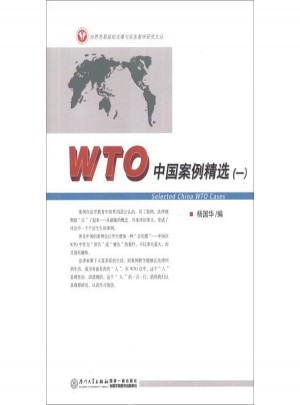
WTO中國案例精選(1)
- 所屬分類:圖書 >管理>WTO
- 作者:
- 產(chǎn)品參數(shù):
- 叢書名:--
- 國際刊號(hào):--
- 出版社:廈門大學(xué)出版社
- 出版時(shí)間:2012-10
- 印刷時(shí)間:2012-10-01
- 版次:1
- 開本:16開
- 頁數(shù):244
- 紙張:輕型紙
- 包裝:平裝-膠訂
- 套裝:否

案例在法學(xué)教育中的作用是認(rèn)可的。有了案例,法律規(guī)則就"活"了起來——從抽象的概念、冷冰冰的條文,變成了社會(huì)中一個(gè)個(gè)活生生的事例。
涉及中國的案例會(huì)讓學(xué)生增加一種"親切感"——中國在WTO中作為"原告"或"被告"的察件,不僅事關(guān)重大,而且饒有趣味。
法律來源于豐富多彩的生活,而案例教學(xué)能夠讓法律回到生活,成為有血有肉的"人"。在WTO法中,這個(gè)"人"是理性的、講道理的。這個(gè)"人"的一言一行,值得我們認(rèn)真觀察研究,認(rèn)真學(xué)習(xí)效仿。
楊國華,商務(wù)部條約法律司副司長,北京大學(xué)法學(xué)博士,西南政法大學(xué)WTO案例教學(xué)研究中心名譽(yù)主任,西南政法大學(xué)兼職教授。曾任國駐美大使館知識(shí)產(chǎn)權(quán)官員,并參與國加入WT0多雙邊談判和外經(jīng)貿(mào)易部WT0法律領(lǐng)導(dǎo)小組辦公室工作,負(fù)責(zé)與國有關(guān)的WTO爭端解決事務(wù),還曾負(fù)責(zé)外國對(duì)華反傾銷的應(yīng)訴、中外知識(shí)產(chǎn)權(quán)談判與合作。主要著作有《WTO爭端解決程序詳解》、《中美知識(shí)產(chǎn)權(quán)問題概況》、《美國貿(mào)易法301條款研究》、《中美經(jīng)貿(mào)關(guān)系中的法律問題》、《國加,NWTO法律問題專論》、《WT0美國鋼鐵保障措施案研究》、《國與WTO爭端解決機(jī)制專題研究》、WTO Dispute SettlementUnderstanding:A Detailed Interpretation、《中美知識(shí)產(chǎn)權(quán)問題概觀》等。
案件一
美國鋼鐵保障措施案
案件二
國汽車零部件案
案件三
國知識(shí)產(chǎn)權(quán)案
案件四
國出版物案
國參與WTO案件統(tǒng)計(jì)
7.514
Therefore, the standard of compliance with Article 61 is the minimum internationally agreed standard set out in that Article. The minimum standard in Article 61 does not defer to China's domestic practice on the definition of criminal liability and sanctions for other wrongful acts in areas not subject to international obligations under the TRIPS Agreement, unless it so states. For example, the second sentence refers to "crimes of a corresponding gravity" which might refer to domestic practice in other areas. However, the first sentence of Article 61 does not make any such reference.
7.515
For the above reasons, the Panel confirms its view at paragraphs 0 to 0 above that the first sentence of Article 61 of the TRIPS Agreement imposes an obligation. The Panel willow turn to the terms used in that provision, read in context and in light of the object and purpose of the Agreement, to determine the scope and content of that obligation. (Iv)Scope of the Obligation
7.516 The terms of the obligation in the first sentence of Article 61 of the TRIPS Agreement are that Members shall "provide for criminal procedures and penalties to be applied". That obligation applies to "willful trademark counterfeiting or copyright piracy on commercial scale". Within that scope, there are no exceptions. The obligation applies to all acts of willful trademark counterfeiting or copyright piracy on a commercial scale.
7.517 The Panel recalls its conclusion at paragraph 0 above that, in China, acts of trademark and copyright infringement falling below the applicable thresholds are not subject to criminal procedures and penalties. The issue that arises is whether any of those acts of infringement constitute "willful trademark counterfeiting or copyright piracy on a commercial scale" within the meaning of the first sentence of Article 61. This requires the Panel to consider the interpretation of that phrase.
7.518 The Panel notes that the first sentence of Article 61 contains no fewer than four limitations on the obligation that it sets forth. These define the scope of the relevant obligation and are not exceptions. The first limitation is that the obligation applies to trademarks and copyright rather than to all intellectual property rights covered by the TRIPS Agreement. The fourth sentence of Article 61 gives Members the option to criminalize other infringements of intellectual property rights, in particular where they are committed willfully and on a commercial scale. Despite the potential gravity of such infringements, Article 61 creates no obligation to criminalize them.
……